I don’t think the meeting was a failure. In general, each meeting is beneficial because it gives the two presidents a chance to exchange point of views, especially when they make corrections regarding the principles presented by the OSCE Minsk Group co-chairmen. It was apparent from the start that there was not going to be any progress; you can predict that just by following up on the current events in Azerbaijan. It’s impossible to think about progress when Azerbaijan is still filled with hatred, spreads the war propaganda and makes war declarations. Any progress after the meeting of the presidents should lead to a series of steps. How can we speak about steps in this kind of environment?
– So, it seems as though both Armenia and Azerbaijan are not ready to compromise. In that case, what will the conflict resolution be?
– The resolution is very simple. International organizations have already approved different documents, in particular the European Council’s No. 1416 resolution, where it is stated that the council doesn’t accept Azerbaijan’s manner of working on the resolution and that it is condemnable. The council has decided to put an end to that. So, those organizations should be able to follow up on the process, find out the results and respond. If they respond harshly, then Azerbaijan will have two options-to either stop working in that manner or continue like that, thus receiving the negative responses of the European Council. However, those responses are going to lead up to the recognition of the independence of Karabagh. This just can’t go on like this for very long.
– As of today, are you content with the follow up and response of the international community?
– The international community has its own approach and customs, which have been around for quite a while. It’s obvious that those customs can’t change just by resolving one conflict. So, we have to take those customs in consideration when giving marks. The current responses go along with the customs, so there is nothing to complain about.
– The Armenian opposition is of the opinion that Kocharyan and Aliev don’t want to resolve the Karabagh conflict, otherwise they would have made compromises a long time ago. Don’t you agree with this?
– There is only one reason why the opposition thinks this way. It’s obvious that they should condemn the Azerbaijani authorities for not wanting to recognize Karabagh’s independence. On the other hand, the opposition must be fiercer with the Armenian authorities, not only in the interests of the Karabagh conflict, but also in their factional, party and in internal political interests. To tell you the truth, I don’t think that this is a good approach. We must at least leave aside political interests when it comes to the Karabagh conflict resolution, especially since I don’t see any vulnerability of the Armenian authorities in resolving the conflict. Back in 1998, when new Armenian authorities came to power, everyone used to say that Armenia was going to be in a blockade, that we were going to lose Karabagh soon and Armenia would find itself in a terrible situation. But eight years later, we see that Karabagh has gotten stronger. Today, you can see many documents stating the fact that the national self-determination right has to be taken into consideration when resolving the conflict. So, this means that Karabagh has gotten stronger. You won’t find any previous document stating that. Thus, the evaluations don’t have anything to do with the current events and developments.
– Many people believe that Armenia will go through the same scenario as in 1998. Is that really possible?
– I don’t consider that a reality because we just can’t come up with abstract scenarios. The 1998 scenario was based on the events going on at the time. I truly believe that the former Armenian authorities and the president thought that if they didn’t go along with the proposed resolutions, then they would face difficult times. They resigned after seeing that they have disagreements between each other regarding their approaches to the Karabagh conflict. The current Armenian authorities don’t have such approaches. On the contrary, the developments prove that Armenia is moving forward, although not at the pace that we would actually like to see it moving. We can state one principle that has been agreed on: the recognition of the national self-determination right as a principle in the conflict resolution.
– It’s clear that the international community is rushing to see the Karabagh conflict resolved. In that case, how beneficial is it to keep the status-quo and how long will this take?
– Our job is to further strengthen the positive tendencies to resolve the conflict and not predict how long the status-quo will last. We must get stronger. I think that Armenia must keep forcing the international community to go along with our approaches and make clear observations on the issues, which it places in front of the negotiators. Follow up on this will lead us closer to the conflict resolution. It’s hard to say how long this will take. We must not think about the time, but rather the process and I believe that this process is going to lead to the recognition of Karabagh’s independence.

